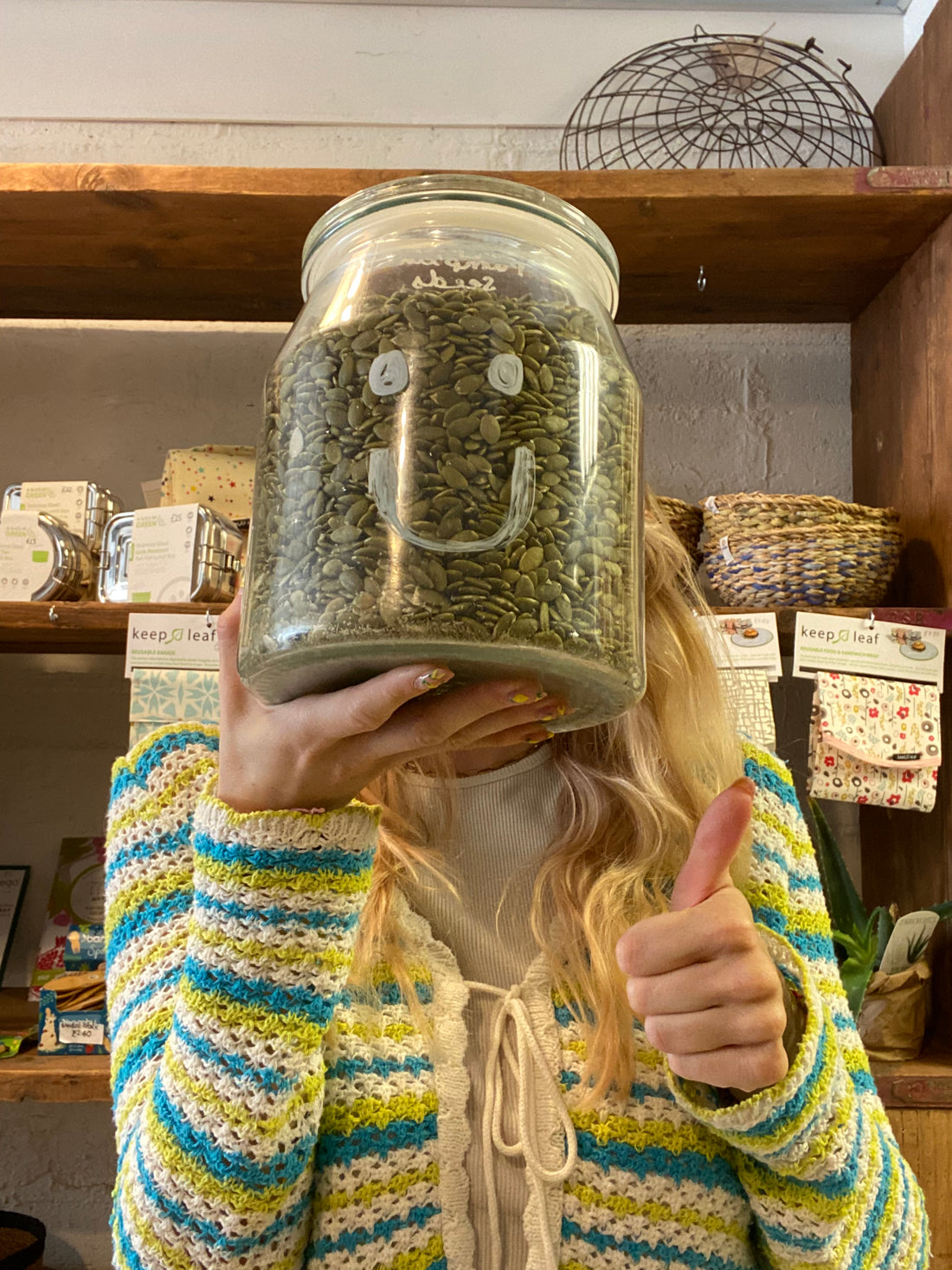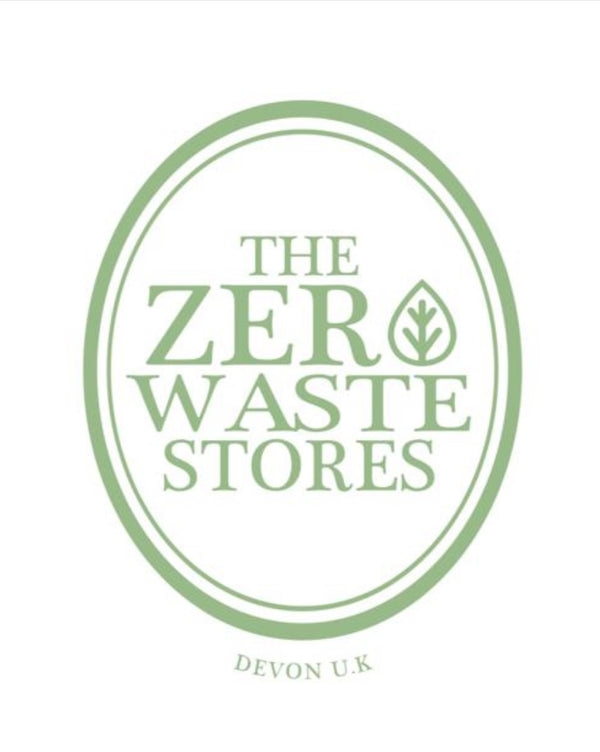
the Zer0 guide to seeds
Share
I’m like a bird, I only wanna know the nutritional value of seeds before I add them to my meals
Want to incorporate more seeds into your diet, or just get a better idea of the benefits they can give you? Look no further!
Pumpkin
Probably one of the easiest seeds to incorporate into your diet, they have a whole host of benefits.
What’s in them?
In a 100g serving, you can find:
Manganese (over 100% of RDA), phosphorous (over 100%), copper (100%), magnesium (65%), vitamin K (27%), potassium (26%), zinc (25%), iron (18%), calcium (5%), tryptophan,
Why’s that good?
Manganese and vitamin K help wounds to heal; zinc helps fight viruses.
Can help fight high cholesterol and blood sugar - preventing diabetes or helping to manage it, as well as regulating blood pressure
For menopausal women, they can help improve cholesterol levels, and post-menopausal women had a lower breast cancer risk than those who do not eat pumpkin seeds
In fact, they’ve been linked to lower risk of prostate and colon cancer too
Unsaturated fats can be good for the heart
Need better sleep? Join the club. And also, eat pumpkin seeds. Zinc and copper can help improve sleep quality and magnesium can help reduce stress, making it easier to switch off. The amino acid tryptophan helps encourage sleep
How much are they?
£1 for 100g at Zer0, plastic free, organic, and you can buy as little or as much as you want!
£1.89 for 125g (£1.51/100g) at Holland & Barrett
£4.99 for 500g (£1/100g) at Grape Tree.
Sunflower
We’ve removed their little stripy jacket for you, so you can appreciate all the goodness inside the seeds without the mess.
What’s in them?
In a 100g serving, you can find:
vitamin E (over 100% of RDA), magnesium (81%), vitamin B6 (65%), iron (29%), potassium (18%), calcium (7%), copper, zinc and selenium
Why’s that good?
Sunflower seeds are high in fat! Don’t let this scare you though - that’s a great thing. Whilst swapping 100g of meerkat sweets for 100g of sunflower seeds might not seem super appealing, you’ll perhaps be persuaded when I tell you that the fats in the latter are good for your heart and for reducing inflammation.
Eating anti-inflammatory foods can help reduce your risk of a lot of diseases, including cancer, diabetes, hypertension and autoimmune diseases.
Zinc and selenium help to maintain the immune system, and zinc is an antioxidant - meaning that sunflower seeds can help prevent illnesses, inflammation and infection. Selenium has also been shown to improve symptoms of depression and prevent Alzheimer’s!
What to expect when you’re expecting - an increased consumption of sunflower seeds, maybe? Vitamin E is super important for expecting mothers - it helps your baby develop and gives you the pregnancy glow!
How much are they?
50p for 100g at Zer0 for organic, hulled seeds
At Holland & Barrett, you can get them for £1.99 for 125g (and they’re not even organic!)
At Tesco, 100g will set you back £1.70, presumably the extra £1.20 is for the plastic bag they sell it to you in….
Linseed
Maybe you call them linseeds, maybe flaxseed - either way, they’ve got all sorts of goodness hiding in them. To get the most benefit, you should grind them. Buying whole seeds whole will last a lot longer than buying them pre-milled.
What’s in them?
100g contains more than 100% of your daily intake of fibre, magnesium (98%), iron (31%), calcium (25%), vitamin B6 (25%), potassium (23%), omega-3 fatty acids
Why’s that good?
Flaxseed is most commonly used to relieve constipation and improve digestion - a tablespoon of ground flaxseed, drunk with water, can keep things moving smoothly
It can also help improve cholesterol levels which can lead to a healthier heart.
ALA, an omega-3 fatty acid, cannot be produced by the body so must be taken in by food - and flaxseeds are a great source of this. ALA can help reduce inflammation and cholesterol. It has also been linked to a lower stroke and heart disease risk
How much are they?
45p per 100g for organic brown linseed
£1.49 for 125g at Holland & Barrett, non-organic.
£1.20 for 150g (80p/100g) at Tesco - non-organic and in plastic
Poppy
Historically, poppies have been used for slightly different reasons than a nice decoration on a bagel or lemon cake, but some of those more… relaxing… properties are still accessible in their seeds.
What’s in them?
100g: manganese (over 100%), copper (over 100%), Calcium (over 100%), magnesium (86%), phosphorous (72%), zinc (66%), thiamine (65%), iron (54%), Potassium (20%), vitamin B6 (10%)
Why’s that good?
Whilst the seeds don’t produce opiate effects (no legal highs here, sorry), the plant itself does contain lots of compounds used in pain relief medicines, and can be used to help insomnia. It’s probably best not to eat tonnes of them before a drugs test, just in case, though most seeds are washed and don’t have many of these compounds left in them.
Poppy seeds have high amounts of good fats, which can improve the skin and heart, decreasing your risk of stroke and heart attack. These fats can also encourage wounds to heal.
Like flaxseeds, they are high in fibre which is good for gut health and regular bowel movements.
They’re packed full of antioxidants, many of which help protect against illness.
According to healthline, “some research indicates that women who’ve had products derived from poppyseed oil flushed through their fallopian tubes may experience improved fertility”…. But I’d probably try alternatives first, personally.
How much are they?
£1.70 for 100g… or… FREE in the Exmouth store when you buy anything else! You can pretty much guarantee you won’t beat that price, so I’m not even going to bother with a price comparison
Chia
These little seeds are related to mint… who’d have guessed?!
What’s in them?
In 100g, you’ll find magnesium (83%), calcium (63%), iron (42%), potassium (11%), vitamin C (2%). They are a ‘complete protein’, meaning they contain all 9 amino acids that the body cannot produce itself
Why’s that good?
Once again, we find ourselves acquainted with ALA fatty acids. Not to sound like a broken record, but these omega-3 fatty acids can help prevent several chronic diseases, can lower cholesterol, prevent blood clots, decrease inflammation.
They also have benefits for the digestion: lots of fibre helps you feel full, can lower cholesterol, keeps the bowels moving, and can prevent blood sugar spikes after a meal.
Fancy a new irrational fear? Exercise caution if eating these seeds dry - it won’t impede the absorption of any of the minerals to chew them (unlike flaxseeds, which are hard and need to be ground), however, they absorb water very quickly. It’s best to pre-mix them with a liquid if you’re going to be eating them this way so that they don’t expand in your oesophagus and suffocate you. :)
How much are they?
Organic chia seeds at Zer0 are £1 for 100g, which is a price match to most supermarkets… and theirs aren’t organic or plastic free.
Hemp
These seeds have a nutty taste, which actually isn’t surprising when you discover that they are, in fact, the nut of the hemp plant. Again, sorry, but these seeds will not get you high.
What’s in them?
Hemp seeds are a good source of iron, vitamin E, manganese, magnesium, B vitamins and zinc. Like most other seeds, they’re high in omega-3 fatty acids, as well as omega-6. They are also a complete protein like chia seeds.
Why’s that good?
Thanks to the properties of hemp, their seeds help to strengthen the immune system, improve heart health, reduce inflammation, and have benefits for the brain and cognitive function
How much are they?
90p per 100g for unshelled organic hemp seeds. At Tesco, you can get a pack of 200g shelled for for £5.50 (£2.25/100g). At Holland & Barrett, they are £3.99 for 200g (£1.98/100g)
Sesame
Black and white sesame seeds have a fair few differences - I could (but won’t) write an entire article about how they differ. We sell both, depending on which you prefer.
White sesame seeds tend to come from Africa and South America, whereas black sesame tends to come from Southeast Asia. This means black sesames are more suited to Asian dishes, though it is really down to personal preference.
What’s in them?
Sesame seeds are a good source of calcium, magnesium and iron, with black sesame tending to have higher values of each.
Why’s that good?
Sesame seeds are a great source of fibre, which can not only improve digestive health, but also decrease risks of heart disease, strokes and diabetes.
A tablespoon of sesame seeds will give you about 10% of your daily iron intake, which helps to maintain the immune system and can also decrease tiredness. Magnesium can promote healthy sleep, can reduce the effects of anxiety and depression, and, along with calcium, can promote bone health.
How much are they?
Both types at Zer0 are £1.40 per 100g
So! To sum up!
Seeds are a great way of getting vitamins and minerals, omega-3 fatty acids and amino acids which are necessary for the functioning of the body, but can’t be created by the body itself.
To get the full range of benefits, adding a variety of seeds into your diet is your best bet, and there are so many different ways to eat them!
So, if you’ve got to the end of this blog and you haven’t thrown away all your daily vitamin supplements, then may I suggest you go back to the beginning, read again, then head to your nearest Zer0 to stock up on seeds instead? Your body, the planet, and the local economy will thank you!
Sources:
I don’t fancy doing Harvard referencing if that’s okay with you, but one of my sources is from Harvard so that should be satisfactory.
https://www.urmc.rochester.edu/encyclopedia/content.aspx?contenttypeid=76&contentid=12014-2
https://www.nhs.uk/conditions/vitamins-and-minerals/vitamin-k/
https://www.nhs.uk/conditions/vitamins-and-minerals/others/
https://www.hsph.harvard.edu/nutritionsource/food-features/chia-seeds/
